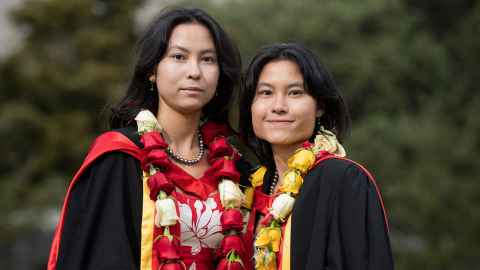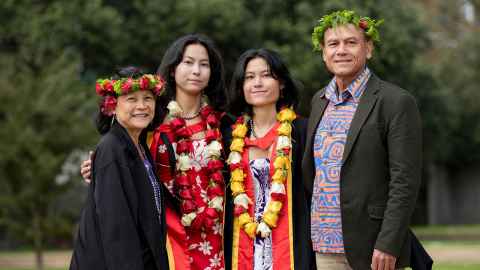The Tahitian twins engineering a legacy
4 September 2024
Twin sisters and PhD graduates, Hukerenui and Ohinerau Bonnet, are paving the way for Pacific women in a traditionally male-dominated field.

On 4 September, Hukerenui and Ohinerau Bonnet (Fa'a'ā, Tahiti) graduated with doctorates in Engineering from Waipapa Taumata Rau, University of Auckland.
The dynamic duo’s enduring connection to Aotearoa New Zealand stems from their ancestral roots in Mā’ohi Nui (Tahiti).
Their French-speaking parents, Ronald and Carmen, temporarily relocated to Tāmaki Makaurau in preparation for the twins' birth because it was medically safer than Tahiti and they were born at Auckland Hospital in 1997.
In recognition of their ties here, their father and sister Punareva gave them Māori names to honour some of the tūpuna from Aotearoa, symbolising their bond in the ancient histories of Polynesian voyagers who crossed the oceans together.
After spending their childhood and high-school years in Tahiti, they returned to Aotearoa for University, 17 years later.
Then came their mission to pursue their doctorates and, along with that, tackle the challenges faced by Pacific women in engineering. Now, Hukerenui (Huke) and Ohinerau (Ohi) have earned their PhDs in Civil and Environmental Engineering.

The Bonnet twins attribute their success to the University’s Tuākana programme, an educational community for Māori and Pacific students and staff, which they say has supported their cultural identity as Mā’ohi Tahitian and empowered them to succeed in their studies.
"The Tuākana programme was our gateway into the University and gave us the foundation we needed to embrace our heritage while excelling in a field, engineering, where Pacific women are under-represented," they say.
“We both think it’s important to have more women in the engineering academic field, but it’s even more important to have Pacific women in this field because there is a lack of representation for our people. This is an area where Pacific women can be the best and thrive.
“It is also important to include diverse perspectives, particularly those of women, when designing solutions. Without that diversity, you’re not making the best decisions.
“In our first year, the University was thrilled to see women’s representation increase to 27 percent – though that number is still very low.
“In our tutorial homes, there would often be only four women – including us. More often, there was just one woman per home, and sometimes none.”
The sisters hope to inspire more Pacific women to enter engineering, just as they were inspired by their co-supervisors, Dr Tumanako Fa’aui, Dr Wei-Qin Zhuang and Dr Shan Yi.
We both think it’s important to have more women in the engineering academic field, but it’s even more important to have Pacific women in this field.
Huke's research for her doctorate was about cleaning up wastewater. She used local bacteria to help reduce pollution from nutrients, making the process eco-friendlier by using hydrogen-based methods.
"This is especially important in Aotearoa New Zealand because agriculture is such a big part of this country," Huke explains.
Ohi's research focused on studying enzymes called laccases, which are made by fungi and bacteria to break down tough, woody materials. These enzymes also have cool uses in biotechnology. She says they offer more natural ways to solve environmental engineering challenges.
“It’s a very Polynesian concept to acknowledge that the health of our fenua (land) is directly related to the health of our people.”
As they explore the next phase of their careers, Huke is excited to continue her academic journey through a post-doctoral contract at the University of Auckland where she will teach.
Meanwhile, Ohi aims to use her expertise in environmental engineering on industry projects that benefit the environment and communities. She is particularly interested in working with iwi, hapū and other Indigenous groups.
Their journey has not been without its challenges. Moving away from Tahiti and living far from their family was initially difficult for the twins. However, they found support in the close-knit Māori and Pacific communities at the University and have also had regular visits to Tahiti.
“Generally, people in Tahiti who wish to pursue academia tend to go to France because we are a French-speaking nation,” they say. “However, we felt that Aotearoa New Zealand had a cultural structure similar to that of Mā’ohi, which helped ease our homesickness. It’s also a lot closer.”
When asked about their future, the twins leave the door open, embracing the oceanic wisdom passed down by their father: “We are descendants of the people of the ocean who followed the stars and the waves.”
For now, they are content to chase their own stars and waves, knowing that their journey is far from over.
Hukerenui means a large cascade or waterfall, a name that originates from Te Tai Tokerau (Northland).
Ōhinerau is the name of an Auckland maunga (Mount Hobson) and means the place of Hinerau, the goddess of whirlwinds.
Media contact
Te Rina Triponel | Kaitohutohu Pāpāho Māori
te.rina.triponel@auckland.ac.nz